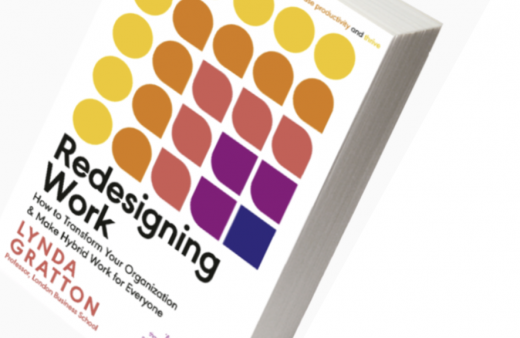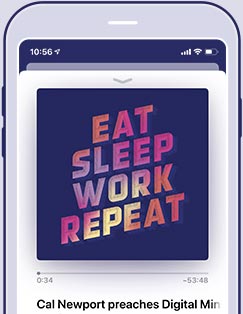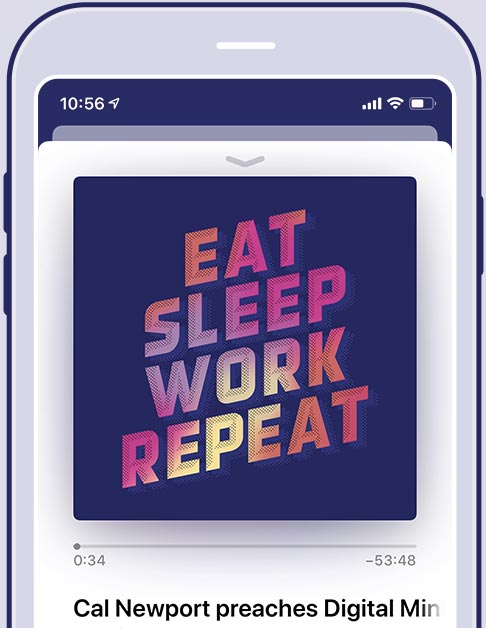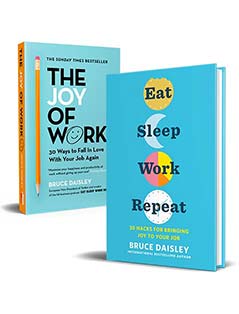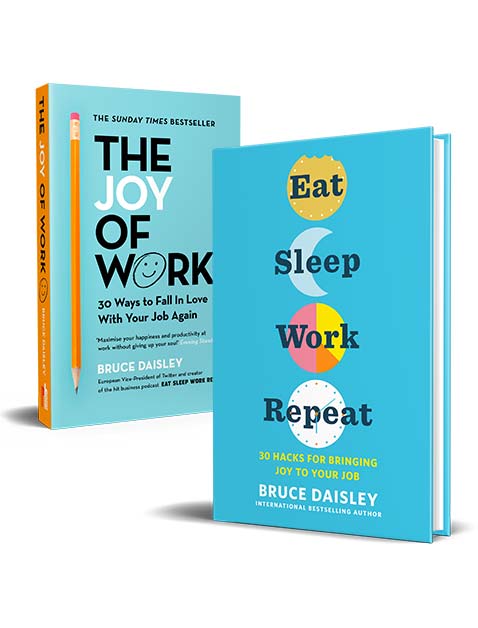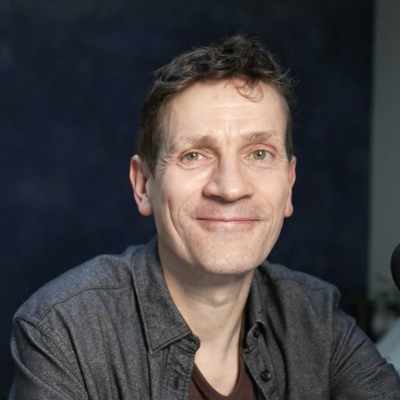The Results Only Work Environment
Dan Pink has called ROWE the future of work. ROWE is the Res.png) ults Only Work Environment. It’s the idea that we don’t worry about what people do at work as long as the job gets done. That means they don’t have to come in at 9. Or 10. Or 11. Or go home at 4. If they do the job, that’s what we asked them to do…
ults Only Work Environment. It’s the idea that we don’t worry about what people do at work as long as the job gets done. That means they don’t have to come in at 9. Or 10. Or 11. Or go home at 4. If they do the job, that’s what we asked them to do…
Jody Thompson is the co-creator of the ROWE system. With Calli Ressler she wrote ‘Work Sucks’
Full transcript
I’m so grateful that you’ve given the time to talk to me. In the course of the work I’ve been doing these two books I’ve really loved. I’ve loved your book and I’ve loved the other book that I mentioned to you “Social Physics”. You and Cali Ressler came up with ROWE. For me it’s one of the most remarkable things I’ve encountered would have been studying work culture. Partly from the outside because it seems more than a little scary and I guess my first response surprise that you were working at Best Buy. Can you tell me how it came about in such a traditional organisation?
JODY THOMPSON: Yeah that’s a great question and you know Best Buy, Like all organisations, they’re trying to solve for many of the same human capital challenges. They’re trying to solve for things like attracting and retaining the best talent, productivity, capacity planning, how do we get more from less, real estate footprints, work life balance, better benefits, amenities. They’re all solving for these challenges but they’re using the same tools and techniques and strategies and many of these techniques are from the 20th century. And my favourite one is using flexible work options or flexibility for work life balance challenges and calling it ‘innovative’. Now when you think about that The Kellogg Company started manipulating schedules in the 1930s and flexible schedules are not an innovative idea.
Flexible schedule is an oxymoron. So as part of an innovation engine at Best Buy, ROWE is an idea that Cali and I developed that was not a benchmarked idea. What we realised is that people do not want flexibility. They really want more control over their time. In a flexible workplace, managers have more control over people’s time. People don’t have more control over their time.
So ROWE gives everyone 100 percent autonomy and 100 percent accountability no results no job. ‘Not no results we’re taking away your telework day’ – that is just silly. So that’s how it started at Best Buy.
These are some extremes aren’t there are. There are some things in there that when you read through them you initially, from the outside, and you see these people’s reactions all the time. There’s one of them which is ‘no meetings are compulsory’ or ‘all meetings optional’. Do people initially reel in surprise against that?
JODY THOMPSON: That’s the one thing that people really get afraid of when they look at the Results Only Work Environment. Everywhere that I go, in every speaking engagement I do, I’ll say to the audience ‘how many are you waste time in unproductive meetings?’ and all of their arms race up into the air. And then I’ll say ‘let’s talk about how much of your time is wasted in unproductive meetings’ and it’ll be 30 to 90 percent of people’s time is wasted in unproductive meetings. And then I’ll say ‘why do you go to them then?’ And they just shake their heads.
JODY THOMPSON: So there’s something about meetings and the way that we do meetings every day in our business life, that we just keep doing it like drones over and over. And ‘every meeting is optional’ is one of those things that starts to change work culture. When you have control over your time, which is what Results Only Work Environment does you start to think ‘am I going to go to your nasty ass meeting that is going to waste my time or am I going to ask the right questions?
So let’s say that you invite me to your meeting. I will look at it and I will go ‘hmmm. Is that a good waste of my time, a customer’s time and the company’s money? What is the outcome of that meeting? What is my role? What do I need to do to prepare?’ And if as the meeting organiser have not thought that through and you’re going to waste my time, the company’s time and the customer’s money I will call you on that.
Every single person in a Results Only Work Environment gets to make that choice. It’s very powerful. And so what happens when you do that is everybody gets together and they say OK we’re going to make sure that every time we meet we’re going to be highly productive in what we do. So meetings fall off the calendar but it doesn’t mean people don’t meet. It means when they do it’s productive, it’s shorter. We meet in a different way. We might meet for five minutes. We might meet to meet on Skype. We might meet texting. But it’s very productive and it’s short and we know exactly the outcome of that meeting.
Meetings fall off – all those meetings that we have every week. Ongoing meetings where we’re all going to go around the table and talking about what we did last week. What a waste of time!
One of the things that fills me with fear is when people say ‘we’ve got 27 minutes left of the meeting and I thought we’d talk about this’ and you say that the meetings half in time at the very least. Is that right?
JODY THOMPSON: Yes they do because filling time is also very silly. If you have a meeting that’s an hour but you’re done in 15 minutes in a Results Only Work Environment everybody leaves. Why would you say ‘we have 45 minutes left what should we do? What a waste of time.
That’s the mindset shift that happens. It doesn’t happen usually in a traditional workplace because people in a traditional workplace are used to filling time and they need to fill time because time is what’s rewarded. How much time you put in, talking about how much time you’re working. ‘I work 60 hours’. ‘Oh my goodness, I work so much’. Everybody is talking about how busy they are. In a ROWE that is not rewarded. And who cares. It’s about getting results so people don’t waste their time any more. When you’re done, you’re done period.
The interesting thing for me was that from the ROWE discussion was that you outlined a one stage in the book you say that ‘work is a place you’d go to, it’s a thing you do’. That seems to be such an important division. You also mentioned a metaphor a couple of times in your work saying that all of us go through school which is a very parent/child relationship. And then we go to college where you’re given the freedom to to run your time exactly as you want. Then we go to work which reverts to school. ROWE seems to the college to work, is that right?
JODY THOMPSON: Yeah. When you go to college if you choose to stay up all night and party and then sleep all day and skip your class and you don’t study you’ll ultimately fail. Theen you don’t get your degree. It’s all up to you. And it’s called consequences. But in the workplace we’re OK with people you know showing up all day, day after day and not producing a single result. And we still reward them with a pay cheque. In a ROWE, a ROWE acts like college. You succeed or fail based on agreed upon measurable results. You are in communication with your team and a results coach on a continuous basis. You’re always autonomous and accountable just like in college. It works just the same way.
I first encountered drove in Tony Schwartz’s book ‘The way We’re Working Isn’t Working’. The reason why it stood out to me there is that the numbers he reeled off about improved productivity. I just wonder if you could give us a sense of some of the results you’ve seen.
JODY THOMPSON: Well I have to say this. I’m going just going to start out with simple: first of all, happy people. In a ROWE engagement skyrockets. Because of that people feel valued, they produce better work and they stick to the organisation. The term absenteeism doesn’t exist in a ROWE, nor does tardiness. Those are elementary school terms. The only thing you can be tardy from or absent from are results in a ROWE. It’s all about performance management.
So people act and are treated like adults. Managers in a ROWE become results coaches. Because of that everyone treats the business like their own. In one organisation they saw top line growth of 100 percent. Now I’m talking topline – in less than five years. Now they have no assigned work spaces for anyone – not even the CEO. Another saw overtime costs drop 50 percent in three months. Things happen quickly in a Results Only Work Environment in terms of results.
Your books act is a perfect methodology to take someone through the benefits of these things. I suspect that most people look at the idea as a great potential but terrified of the consequence. You took through the process to get these results. You talk through the idea of ‘sludge’. Do you just want to explain what that is. You say that the best way to challenge adversity is to name it. Do you want to talk through the idea of sludge?
JODY THOMPSON: Yes sludge is a nasty, stinky thing. So sludge is really judging how other people are spending their time and it sounds like this ‘Mary is leaving early again. I wish I had kids’. ‘How did Bob get a promotion? He’s never even here’. ‘It’s 10:00 and you’re just getting in, I wish I could come in late every day’. Sludge is what keeps cultures stable. It’s all about noticing what someone else is getting and you’re not. And it keeps that Monday through Friday 8 to 5 on site workplace intact. Anything different, it’s labeling. If you’re doing anything different from an 8 to 5 on site, you’re either a remote worker, a teleworker, a flexworker or I’m a luckier than you worker. And Results Only Work Environment makes everything just the work. No labeling. No talking about when people are coming and going. That sludge is really toxic. It’s people feeling like they’re being compromised in some way because they’re not getting what somebody else is getting. All of that language and all that stuff is is irrelevant. People are are focused on the wrong thing but they’re feeling like they’re not getting what somebody else is getting. In a Results Only Work Environment, everybody is autonomous and accountable. Nobody is feeling like they’re not getting what somebody else is getting. So we remove that language it’s called a ‘sludge eradication strategy.
And you just get people to the White Board for these things? Just to work through what they might say?
JODY THOMPSON: Well yes there’s an actual strategy. So if somebody came up to me and said ‘it’s two o’clock, where are you going?’ I would look at them and say ‘is there something you need?’ It’s as simple as that. Because if somebody needs something they just need to ask me for it. Period. In a Results Only Work Environment everybody lets people know what they need and that’s it. If I say to you ‘is there something you need?’ how many times are you going to say to me ‘it’s 2:00 o’clock, where are you going?’ Pretty soon you’re just going to ask for what you need. It’s not going to be about when I’m leaving, when I’m coming, where I am. So in a ROWE everybody is constantly asking for what they need from each other. The work starts happening faster and the communication is crisper. It’s clearer. Everybody’s negotiating what they need, the customer gets what they need. All this nasty language that’s irrelevant starts going out at the workplace.
In Work Sucks, anyone who’s debating these things will be reassured when they see big organisations like Best Buy doing it. You also give the case of Gap. You’re brilliant for saying that they had these significant reservations when they went into it. It proved a great success. But can you just talk us through the process of when an organisation decides that they want to try this, what are the steps that they have to go through to persuade senior management leadership to to adopt a ROWE environment.
JODY THOMPSON: Well this is a very different platform and it’s a very different value proposition because it is an adaptive change. People have to give up a lot of their deeply held beliefs about the way work needs to happen. Things like people believing that when people are not at work, they believe they’re not working. When you think of companies like Yahoo when they brought everybody back in. They believe in their hearts truly that people aren’t working in their not in the office. It’s difficult to convince people that if you give people autonomy they’re actually going to do the work.
What’s really happening is we’re not getting clear with people about what their measurable results are and holding them accountable to that. That’s what’s difficult. What we’re doing instead is we’re having conversations with people about work location and time. We’re having conversations with people about whether or not they get to work from home that day. That’s the problem.
What organizations are doing – this is what what makes me sad – is is they’re still playing around with flexibility. They’re training managers in how to manage the mobile workforce in 2017. Here’s the problem we’re all mobile, everybody is. We need to learn how to get clear on measurable results and stop worrying about managing work location. Manage the work, not the people.
When people say to me who’s doing this well and who isn’t, I have to be really blunt on this one the organisations that are not doing real well that are failing are trying it on their own. The organisations that are succeeding have gone through our process. It’s very difficult. It takes certain steps to help people overcome the inertia of the deeply held beliefs about work. And let go of some of these things and have the tools and strategies to get off on the right foot in adopting this kind of thinking. We have a lot of organisations that have gone through the training that are on the right platform now and aren’t thinking in flexibility terms and saying ‘we’re a ROWE, we let some of our people work from home but not all of them’. That’s not ROWE. Results Only Work Environment has nothing to do with managing work location. Nothing to do with it.
So let’s diagnose that Yahoo one. Simply we’ll do that one because it was it was public. You often see this in businesses, don’t you? A business when it feels like it’s out of control, doesn’t know what people are doing, it decides it’s going to prohibit working from home. So in the case of Yahoo they decided to prohibit working from home. You would say that they just had working from home as a benefit rather than as a Results Only Work Environment?
JODY THOMPSON: Right. When you allow some people to work from home and not others, what you’ve done is you’ve set up a hostile work environment. You’ve not levelled the playing field, you’ve created the haves and have nots. And people still aren’t clear about what the work is and how to measure it. So now when you say ‘the business is not doing well. Oh my goodness what are we going to do? Let’s bring everybody on site’. Now you’ve brought everybody on site and guess what they’re talking about everyday. They’re not talking about the work and getting clear about the work. They’re all talking about when they get to have their flexible work schedule back. They’re all mad. They’re all upset. They’re talking about where they’re going to get a different job. That’s what people are really doing. They’re not getting more clear about the work. Leaders and organisations they think people are working harder when you bring them all back in. They’re not.
And you half do this Jody? I’m just fascinated with the intersection of ROWE and culture. The one thing that strikes me as really fascinating about the way you describe it, and it’s a single mindedness focus on results. Some of the examples in Work Sucks are amazing. One person’s doing a college degree during the day and then doing their job at night. Another person is following a rock band around America and working from there. Someone else is is doing some work (but choosing to do some work) while they are attending to the aftermath of a family funeral. And so people are sort of accommodating work round quite remarkable hurdles. I just wonder the consequence on culture for those things, would it be as suited to a creative environment. I couldn’t see a film being made in this way evidently. Is suited to a sales environment? How would you describe it is necessarily suited to what environments and can half do it.
JODY THOMPSON: It is suited for anybody that does work. We have been in all sorts of different environments. Call centres, retail floors, manufacturing, education, all different kinds of roles. Here’s the main thing you need to think about: since it’s all about getting results. You think about what your your outcome is first. What are we trying to accomplish? And then people work together to make sure that happens. Some work, depending on what your role is, there’s work that people have to come together in a certain place at a certain time. So you just do that. Then there’s other things in your work that you don’t have to be in a certain place in a certain time and then you do that. So every role is different. The examples in the book, some people who are traveling around with their rock band they can do their work from wherever. Other people have to be on site. People make that decision based on what their job is or what their role is. So for example a bus driver. You can’t do that by following your rock band around, you have to drive your bus. It just depends on what your role is. The mindset is still the same. The platform is still the same. And then your role, you adapt your role to it. You’re still autonomous and still accountable. You can’t really go halfway. You can’t be 70 percent accountable. You’re still 100 percent accountable. You don’t want to be 50 percent autonomous. You’re 100 percent autonomous. You’re still on that same platform. You’re still not judging people. You’re still not using sludge and you still all have to work together against the outcome for the organisation and the outcome for the customer.
So potentially the failing of that Yahoo one could have been that there wasn’t clarity about what the outcome should have been, what the results should have been? So because the company hadn’t invested time in working out how to measure success they suspected that the person wasn’t working? is that a fair assumption?
JODY THOMPSON: Yes. That is a fair assumption. They needed to get very clear about that with everybody and then hold everyone accountable to measurable results period. And stop worrying about where people are working from. But also the whole culture needed to start operating that way. So managers need not be answering the question for people ‘can I work from home today?’ That’s a that’s an unquestion.
JODY THOMPSON: Why are managers dealing with that? That’s managing people not results.
In your book you list so many testimonials. There so many examples in there. The thing that really came out to me, is that a lot of people listed that ROWE led to an end or a reduction in workplace politics. A lot of people said ‘I could never leave here now because how could I ever replicate this flexibility? Are there any other thing that you observe when you introduce a ROWE environment?
JODY THOMPSON: Well it’s interesting because one of the things that ROWE does that’s really important is that it levels the playing field. So there is there’s more rising to your level of incompetence. There’s there’s not the Peter Principle. It really brings to life what Dan Payne talks about in his book Drive. So there’s that autonomy, mastery and purpose. When everyone is on the level playing field it’s all about pulling together for one goal. And people get their lives back. The culture becomes opportunistic not entitled. It’s very important when that starts to happen. The whole culture, everybody rises up. There’s a different level of excitement and pulling together of people in a culture like this. You’ll see things happening like people coming up with more ideas. People say things like ‘I think I’m doing more work but I feel happier’ and ‘I feel better’, ‘I’m connecting with different things in my life that I didn’t connect with before’, ‘boy I would just never leave this organisation’. We had some people tell us ‘nobody could offer them enough money to leave’. There wouldn’t even be a number they could think of.
People, we think, are driven by money and status and all these other things. But what we learned is that that’s not really what they’re driven by want to do the job. If they’re in a traditional workplace and they think well I’ll be happier if I have more money and more status. Once they’re in this new environment where they literally have their life back. They get to connect up with the things that are truly important to them they would never want to give that up. And you can’t offer them enough money to give that up. That’s what we learned.
There’s one other thing that really touched me, it’s not necessarily related to ROWE but you talked about one of the other dysfunctions of work right now is that war metaphors are often very common. And this really connected with me. I used to have a boss who took me to Winston Churchill’s Cabinet War Rooms for one offsite to try and hammer home the war metaphor. You mention it was a terrible way to frame work to explain why.
JODY THOMPSON: Well you know it’s funny that people use all of these different funny things to try to get people into meetings. I think there’s one way to framework and that is: was it the work? What’s the outcome that we’re trying to achieve? Who is the customer? And then once you understand what that is you figure out what the activities are that are going to get you there. What are the activities that you’re currently doing that are wasting time? Get rid of them.
Then how are you going to measure your effectiveness? That’s it. And guess what? Once you figure that out. Get on the platform about autonomy and accountability and you’re golden. All this other stuff is just things that are trying to get people to fit into the old system. I often say to people that it’s like we’re in The Matrix. Once you’re in a Results Only Work Environment, it’s like you are outside The Matrix looking in. You just start to laugh at all these other things, because it’s senseless. Why are we pretending that we have to play all these games to waste our lives? No more wasting time, no more wasting our lives. Let’s get down to business. Let’s find out exactly what we’re supposed to be doing and get rid of all this other waste of stuff. Get it done.
And I guess to finish it off I mean I’ve mentioned how much I’ve loved the work that you’ve done and Work Sucks for me was a breath of fresh air. It was almost 10 years ago now. What does the ROWE movement look like today? How do you spread the word personally?
JODY THOMPSON: Well you know it’s been a long time since that book came out. Since then we actually wrote Why Managing Sucks And How To Fix It. And that came out in 2013. We were trying to nudge managers along. It’s like the field guide. That’s one way we’ve been trying to spread the word. We also created ROWE University. And you can get to that from our website. That helps organisations adopt some of the concepts using online training. What we’re trying to do is we’re trying to establish as much of the truth of ROWE as possible. So many organisations are are still saying ‘we’re ROWE, we let some of our people work from home’ and they’re so far off from what that is. Or they’re saying ‘we have ROWE for our salaried employees only’ and it hurts my heart. So hopefully over time we’ll get more and more authentic organisations on board who will get trained by us and adopt that authentic platform. We can get more people adopting this authentic platform so we can move the future of work to more and more organisations that are going to help each other with the autonomy and accountability platform. Where people can really thrive and that the future generation can really pull this across the line. I think this is where we’re going. People like Dan Pink, he sees the future of this as well. Results Only Work Environment, like he said in his book ‘this is the the platform that brings that to life’. I’m excited to continue talking about it. Continue talking to people like yourself getting it on podcasts talking to the media. Perhaps writing another book and training as many organisations that are willing to take it on. That’s what we’re doing.
[/et_pb_text][/et_pb_column][/et_pb_row][/et_pb_section]



